|
|
|
Sort Order |
|
|
|
Items / Page
|
|
|
|
|
|
|
| Srl | Item |
| 1 |
ID:
150829
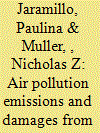

|
|
|
|
|
| Summary/Abstract |
This paper uses air pollution emissions data for the years 2002, 2005, 2008, and 2011 to estimate monetary damages due to air pollution exposure for PM2.5, SO2, NOx, NH3, and VOC from electric power generation, oil and gas extraction, coal mining, and oil refineries. In 2011, damages associated with emissions from these sectors totaled 131 billion dollars (in 2000$), with SO2 emissions from power generation being the largest contributors to social damages. Further, damages have decreased significantly since 2002, even as energy production increased, suggesting that, among other factors, policies that have driven reductions in emissions have reduced damages. The results of this analysis highlight the spatial heterogeneity of the impacts associated with the emissions of a given pollutant. In the past, environmental regulations have assumed that the benefits of air emissions reductions are homogenous across source location. This analysis suggests that policy designs that account for spatial differences in the impacts of air emissions could result in more effective environmental regulation. Accounting for such spatial heterogeneity in the benefits of policies would be akin to accounting for differences in compliances costs across states, which the EPA did when establishing the state emissions standards for the Clean Power Plan rule.
|
|
|
|
|
|
|
|
|
|
|
|
|
|
|
|
| 2 |
ID:
131276


|
|
|
| 3 |
ID:
149923
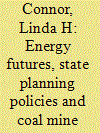

|
|
|
|
|
| Summary/Abstract |
The United Nations 2015 Climate Change Conference established a framework for keeping global temperature increase “well below” two degrees Celsius through commitments by the parties to significant reductions in greenhouse gas emissions. The agreement has implications for the energy policies of all countries, not least major coal exporters like Australia. By contrast, the government's 2015 Energy White Paper lays out the vision for the country's future as a “global energy superpower” dominated by the export of fossil fuels for decades to come. Legislative frameworks around planning, land use, mining, heritage and environment have moved in synchrony with this agenda. Rural landowners in the big coal rich geological basins of Australia are directly impacted by current government policies on energy exports and on domestic supply. This article follows the coal value chain to rural communities in New South Wales where new mines are being built, and analyses the politics of land use, natural resources and energy from the vantage point of landowner engagement with government and corporations in the policy, legislative and regulatory domains. The need for more equitable, democratic and precautionary approaches to energy policy, heritage and environmental planning and agricultural land use is highlighted.
|
|
|
|
|
|
|
|
|
|
|
|
|
|
|
|
| 4 |
ID:
158088


|
|
|
|
|
| Summary/Abstract |
In the period 1946–1948, 13,721 Polish miners were repatriated by the state from France to Poland. The repatriation was vital to the development of coal mining. This repatriation was distinct because it did not involve returning to Poland people who had been displaced during the war. These Poles had emigrated to France during the interwar period. After a successful start, when over 5,000 men and their families came to Poland in 1946, the project came to a halt. Poland was not a welcoming environment for these men and France wanted to retain them.
|
|
|
|
|
|
|
|
|
|
|
|
|
|
|
|
| 5 |
ID:
183566


|
|
|
|
|
| Summary/Abstract |
The global momentum toward decarbonisation complicates existing challenges that regional production communities are navigating as they seek prosperous and sustainable futures. In this paper, we explore local residents' priorities for policy processes in the Upper Hunter in New South Wales, Australia. Our research focused on the aim of achieving social wellbeing and economic diversification within this energy-contested region. Using interviews (n = 42), we present several findings that can guide policy processes in the Upper Hunter, and inform processes in other communities. We find that local perspectives on the future of coal are more nuanced than the often binary public debate, indicating a common ground for local policy dialogue. The legacy of conflict between the two dominant sectors – coal mining and thoroughbred breeding – shapes perceptions about new industries for the region. There is an expectation that government will take a leading role in the region's efforts toward economic diversification, though this should be in partnership with industry and community. A plan that provides certainty and diverse, relevant opportunities for the region is desired. From these and other key findings we emphasise the importance of focusing on the social dimensions as a core part of the policy process, and suggest participatory and deliberative processes.
|
|
|
|
|
|
|
|
|
|
|
|
|
|
|
|
| 6 |
ID:
176582
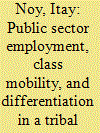

|
|
|
|
|
| Summary/Abstract |
India's adivasi, or tribal, communities have most often been depicted as homogeneous and egalitarian, at least compared to the entrenched social hierarchies that characterise rural caste society. This article draws on fieldwork in a mining-affected adivasi village in Jharkhand, eastern India, to consider how compensatory public sector employment for mining-induced land dispossession has contributed to new processes of stratification within adivasi society. On the one hand, compensatory employment allowed those who attained it to pursue increasingly common middle-class aspirations, and a considerable degree of class mobility. But on the other hand, it fostered new, enhanced forms of intra-adivasi differentiation – not only in terms of income but also consumption and lifestyle, education and children's life chances, and household and gender dynamics. New internal disparities, in turn, have acted to erode pre-existing elements of adivasi society that revolve around values of egalitarianism.
|
|
|
|
|
|
|
|
|
|
|
|
|
|
|
|
| 7 |
ID:
182942
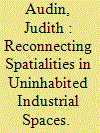

|
|
|
|
|
| Summary/Abstract |
Far from dense Chinese cities that experience fast demolition, ruination in Kouquan, a coal town in Datong, is a slower process that generates new practices and meanings. Uninhabited industrial spaces continue to produce a sense of place where large industrial corporations no longer operate and where most residents have moved away. This article brings out new perspectives on the effects of ruination in an industrial area by moving away from the lenses of the work unit, demolition, heritagisation, or decline. Based on direct observation, informal discussions with local residents from 2016 to 2019, and an online review, this article shows that ruination produces spatialised narratives and practices closely entwined with the local population’s experiences, as well as with other actors’ direct and indirect interactions with places: these actors reconnect to the uninhabited town through dwellings, artistic production, religious practices, or simply through their visits to Kouquan, becoming urban explorers themselves. Ruination leads remaining residents, former locals, visitors, government actors, journalists, and artists to the production of new representations of the uninhabited town.
|
|
|
|
|
|
|
|
|
|
|
|
|
|
|
|
| 8 |
ID:
166454
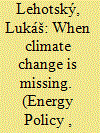

|
|
|
|
|
| Summary/Abstract |
One of the EU's main decarbonization goals is a reduction in the energy use of coal. It would be a mistake, however, to assume that public support for decarbonization can be gained automatically by pointing out threats from climate change, particularly in light of the role coal plays in the local and national economy and in energy security. In this article we search for factors affecting public support for a coal phase-out in media content. According to the theory of agenda setting, the media establishes problems calling for solutions and influences public perceptions of the (un)importance of those problems. We illustrate this case on the example of the Czech Republic. The paper demonstrates that Czech media has cultivated a discursive environment in which coal mining is separated from coal combustion, neglecting the inevitable interconnection of these two processes; coal consumption is not characterized as an environmental problem; and the economic problems of private companies more easily become public problems, making future coal phase-out policies harder to implement.
|
|
|
|
|
|
|
|
|
|
|
|
|
|
|
|
|
|
|
|
|